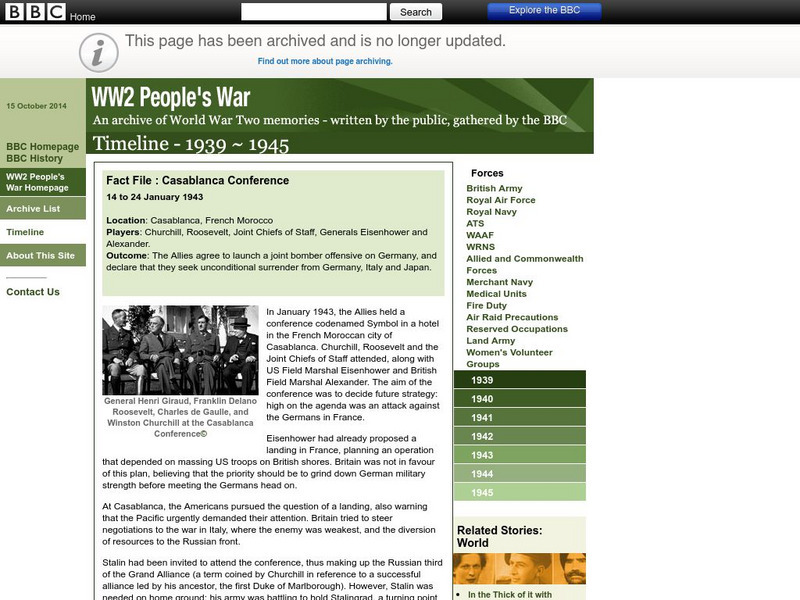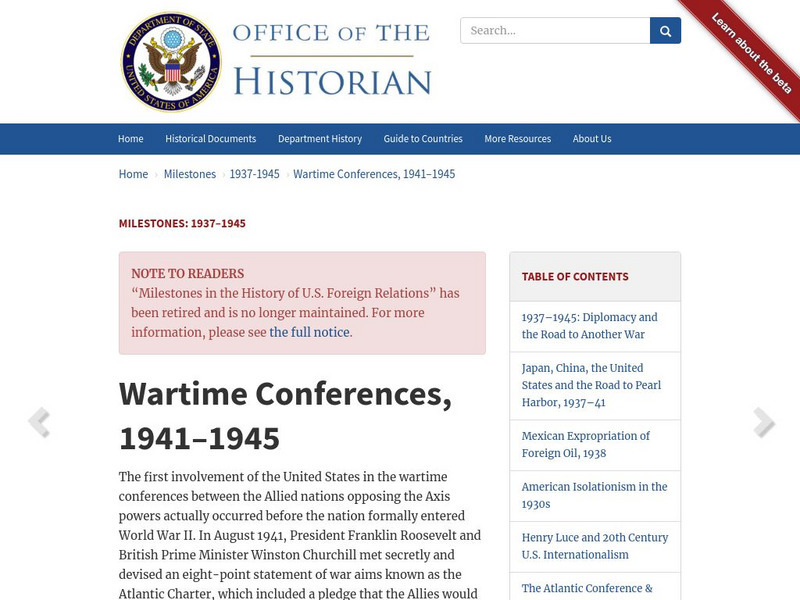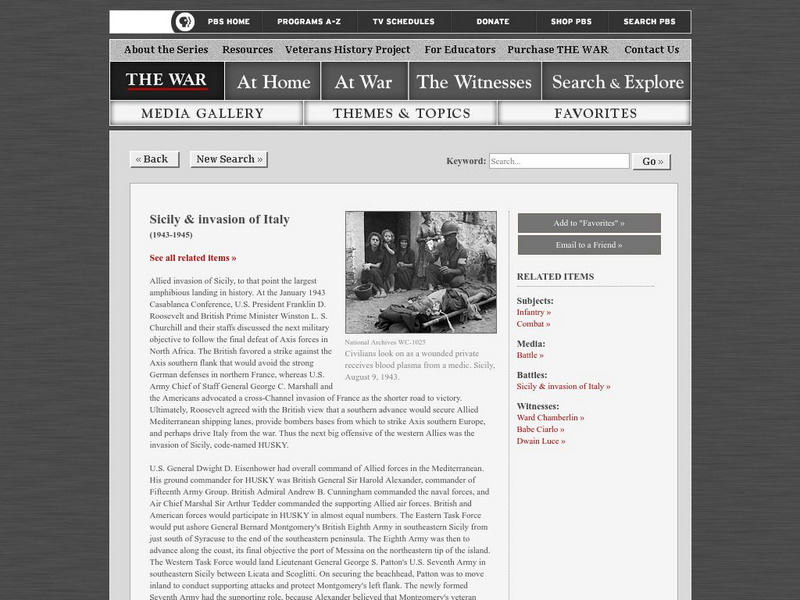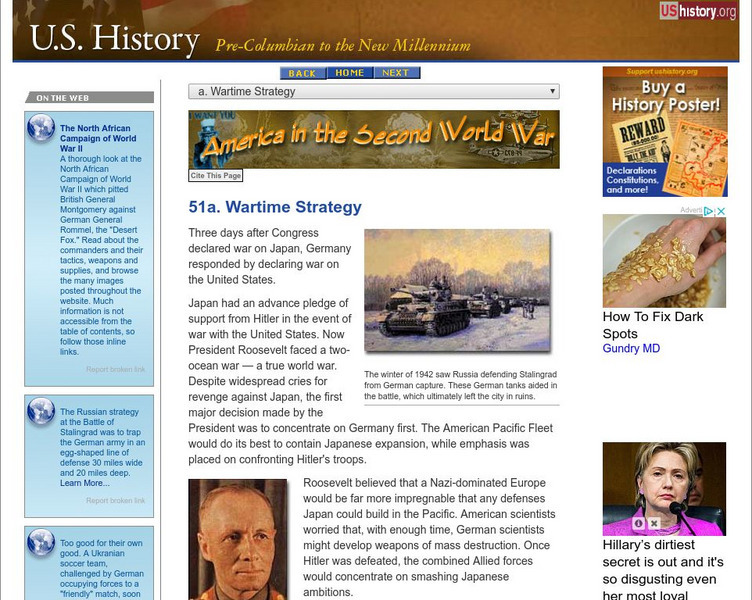Smithsonian Institution
World War II
December 7th is remembered as a tragic time in American history, but some scholars may not know why. The resource explains the significance of the bombing of Pearl Harbor as well as how World War II relates to American history. The...
Smithsonian Institution
Cold War
The Cold War was not necessarily always cold in temperature, but the relationship between the United States and the Soviet Union sure was frigid! Scholars read various passages, view exhibition graphics, and observe an artifact from the...
BBC
Bbc History: British Bombing Strategy in World War Two
Read about the bombing strategy of the RAF during World War II, but primarily at the end of the war and the bombing of Dresden.
Independence Hall Association
U.s. History: America in the Second World War
A brief description of the course of World War II in both Europe and the Pacific. Read about the new technologies developed for the military by both the Allies and Axis powers, and find out about the millions who died as a result of the...
US Army Center
U.s. Army Center of Military History: The Centennial: Omar Nelson Bradley
This lengthy biography of General Omar Bradley was written on the centennial of his birth. It traces his life as a military man through World War I, World War II, and Chairman of the Joint Chiefs of Staff. Included is a map that shows...
Ohio State University
E History: The Second World War
An interactive chronicle of WWII. Starts with the causes of WWII and goes through the entire war step by step. Interactive maps, videos, and a step by step explanation of each event.
Other
The World at War: Axis Offensive 1941
The involvement of Great Britain was an important part of the allied attempts to defeat the axis powers. This site provides a timeline of events in World War II, and gives a good general idea of Britain's role in the events of war.
US Army Center
U.s. Army Center of Military History: World War Ii Campaigns: Sicily
This brochure from the Center of Military History recounts the Allied invasion of Sicily at the beginning of the Italian Campaign.
PBS
Pbs: Wwii Behind Closed Doors:the Conferences
This site provides a comprehensive overview of many conferences between Franklin D. Roosevelt and Winston Churchill and the Allies' conferences with Stalin and others during World War II and includes links to related resources and media.
Ducksters
Ducksters: World War Ii History: Ww2 Axis Powers for Kids
Kids learn about the Axis Powers of World War II in history. These countries such as Germany, Italy, and Japan fought the Allies.
Independence Hall Association
U.s. History: The Arsenal of Democracy
Although Americans remained isolationist in their thinking, President Roosevelt understood that the European allies needed help against the Germans. Read about the incremental ways America became involved in World War II in Europe...
Ducksters
Ducksters: World War Ii History: Ww2 Allied Powers for Kids
Kids learn about the Allied Powers of World War II in history. The Allies such as Britain, the Soviet Union, and the United States fought the Axis Powers.
Digital History
Digital History: From Wartime Allies to Cold War Enemies [Pdf]
This timeline traces the devolution of the relationship between the United States and Soviet Union from the end of World War II, where these two countries were allies, albeit suspicious of each other, and almost a year after the end of...
Digital History
Digital History: War in Europe [Pdf]
This site is from a unit that covers the period from the Second World War up to the Cold War. It looks at the course of the war in Europe, and America's involvement after the bombing of Pearl Harbor. It examines the military strategies...
BBC
Bbc Ww2 People's War: Casablanca Conference 14 24 January 1943
A brief description of the Casablanca Conference where Allied leaders met to plot out the future strategy for World War II. Read about the final outcome of the conference and the issues that were considered in the decision-making.
Curated OER
National Park Service: Eisenhower National Historic Site: Military Career
Online exhibition details aspects of Eisenhower's military career, beginning with his days as a West Point cadet. Covers his campaigns in North Africa and Italy, his appointment as Supreme Allied Commander, the Normandy invasion, and his...
Other
North Africa Campaign in Wwii: Supplying Troops
An informative site on how the Allied troops supplied troops during Operation Torch. Discusses one of the problems that the allies faced with Operation Torch.
US Department of State
Milestones: 1937 1945: Wartime Conferences, 1941 1945
A brief description of each major conference held by members of the Allies in World War II discussing how the course of the war would be fought and ideas of what would happen when the war ended.
Massachusetts Institute of Technology
Mit: Inventor of the Week: Hedy Lamarr
Use this site to learn about Hedy Lamarr (1913-2000 CE), the movie actress who "helped the Allies win World War II" through her involvement in inventing "a classified communication system."
Veterans Affairs Canada
Veterans Affairs Canada: D Day
Examines with clarity and conciseness the role Canadian soldiers played in D-Day.
PBS
Pbs: The War: Sicily and the Invasion of Italy
At the online companion site of the PBS documentary series "THE WAR," find a write-up about Allied invasion of Sicily, which to that point was the largest amphibious landing in history. With links to related resources, including archive...
Independence Hall Association
U.s. History: Wartime Stategy
Initial focus by the Americans in World War II was containing Germany. Read about the Allied war stategy to "close the ring" and deprive Germany of men and materiel.
University of Virginia
Miller Center at Uva: u.s. Presidents: Fdr: Fireside Chat 27: On the Tehran and Cairo Conferences
After Franklin Roosevelt's meeting with other Allied leaders in Tehran and Cairo in December, 1943, he gave a fireside chat on December 24 to inform the American public what transpired and how the Allies planned on ending the war.
PBS
Pbs: American Experience: The Bombing of Germany
It took 6 years to defeat Hitler. This documentary discusses the American offensive, the strategic plans used to defeat Germany and the moral dilemma they faced.








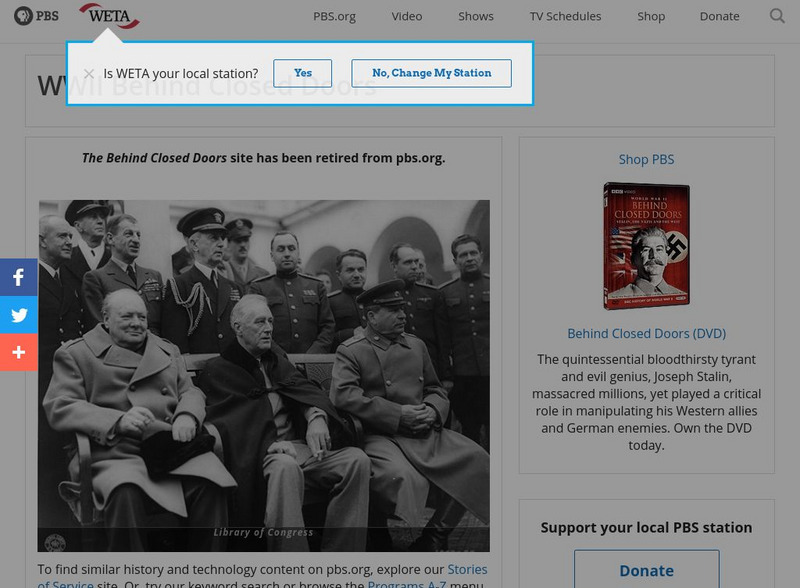

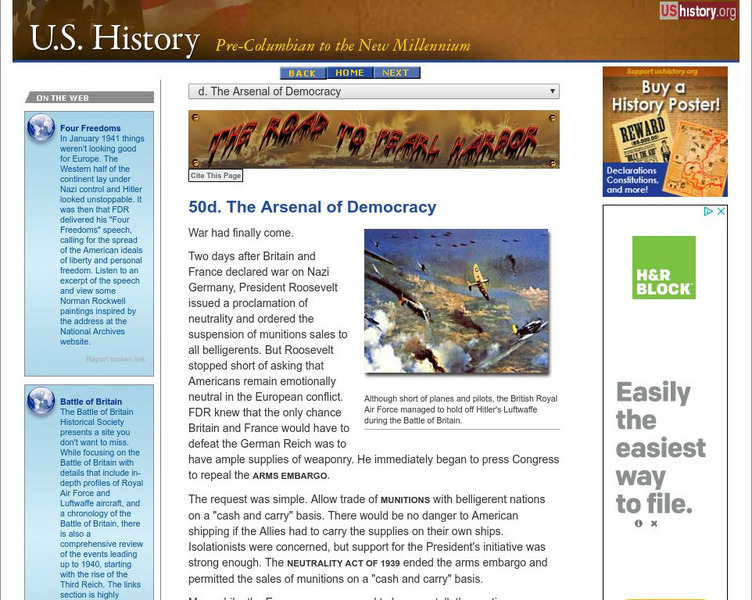

![Digital History: From Wartime Allies to Cold War Enemies [Pdf] Website Digital History: From Wartime Allies to Cold War Enemies [Pdf] Website](https://d15y2dacu3jp90.cloudfront.net/images/attachment_defaults/resource/large/FPO-knovation.png)
